| Founded | 1950s |
|---|---|
| Founding location | Auckland, New Zealand |
| Years active | 1950s–present |
| Ethnicity | Polynesian |
| Membership (est.) | 400 [1] |
| Criminal activities | Drug dealing, assault, murder |
| Allies | Bloods, Crips, Black Power, Central Auckland street gangs |
The King Cobras are a prominent Pacific gang in New Zealand. [2]
The King Cobras were founded by Samoans in Ponsonby sometime in the 1950s, making them the oldest gang in New Zealand. [3] Initially, it was restricted to Samoans, but has since accepted other Polynesians. [3] The King Cobras have had a presence across South, Central, [4] North [5] and West Auckland, [6] Hutt Valley, Wellington [7] , Dunedin [8] and Christchurch. [9]
The Cobras have proven to be very violent [3] and have a history of possessing firearms. [10] They have been involved in major cases of drug dealing, [3] including in methamphetamine, cocaine, and marijuana. [6] In 2003, members of the King Cobras ran a large methamphetamine ring along with the Head Hunters in one of Aucklands biggest drug cases. [11] [12] The King Cobras have been involved in several murder cases, including that of a 15-year-old boy, [13] and the shooting of a rival gang member, as part of a membership process. [14]

Malo Ioane Luafutu, also called Jeshua Ioane Luafutu, and better known by his stage name Scribe, is a New Zealand rapper of Samoan descent. He achieved two solo number ones on the singles chart from his debut album, The Crusader, which was released in 2003 in New Zealand and later certified four times platinum. He also reached number one as a featured artist on P-Money's 2004 song "Stop the Music", and in 2010 on R&B singer J.Williams' single "You Got Me".

Rail transport in New Zealand is an integral part of New Zealand's transport network, with a nationwide network of 4,375.5 km (2,718.8 mi) of track linking most major cities in the North and South Islands, connected by inter-island rail and road ferries. Rail transport in New Zealand has a particular focus on bulk freight exports and imports, with 19 million net tonnes moved by rail annually, accounting for more than half of rail revenue.
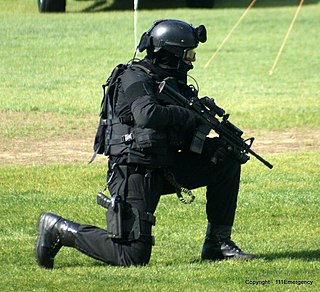
The Armed Offenders Squad (AOS) are specialist part-time units of the New Zealand Police based around the country available to respond to high risk incidents using specialist tactics and equipment.
The Mongrel Mob is an organised street gang and prison gang based in New Zealand. With a network of more than thirty chapters throughout the country and additional operations in Australia and Canada, the Mob is the largest gang in New Zealand. They are especially active in the King Country, Kawerau, Ōpōtiki, Waikato and Hastings. The Mongrel Mob's main rival is the Black Power gang; there have been several very public and violent clashes between the two gangs over the years.
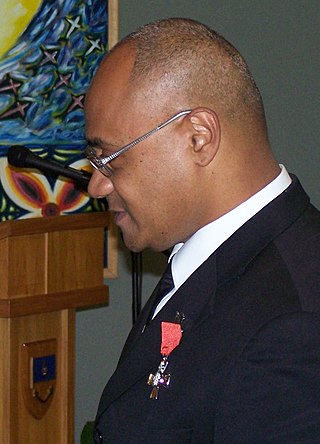
Oscar Vai To'elau Kightley is a Samoan-New Zealander actor, television presenter, writer, journalist, director, and comedian. He acted in and co-wrote the successful 2006 film Sione's Wedding.
Armageddon Expo is a New Zealand owned and operated pop culture convention that holds multiple events around New Zealand in cities including Auckland, Wellington, Tauranga and Christchurch. The event, run by Beyond Reality Media Premier Event Management, has been running continuously since 1995. It has evolved from its roots of comics and trading cards to showcase computer and video gaming, animation, film and television, cosplay, comics, live wrestling, and retailers selling pop-culture merchandise.

There are numerous gangs in New Zealand, of varying criminality, organisation and ethnicity, including outlaw motorcycle gangs, street gangs and ethnically based gangs. A chapter of the Hells Angels motorcycle club was formed in Auckland in 1961, the first Hells Angels chapter outside the US. Soon after, the Mongrel Mob formed in Hastings and Wellington, developing into a predominantly Māori and Pacific Islander gang, and having the largest membership in the country. Through the 1960s and 1970s, other outlaw motorcycle clubs and ethnically based gangs formed, including another predominantly Māori gang, Black Power, which grew to rival the Mongrel Mob.

The use of cannabis in New Zealand is regulated by the Misuse of Drugs Act 1975, which makes unauthorised possession of any amount of cannabis a crime. Cannabis is the fourth-most widely used recreational drug in New Zealand, after caffeine, alcohol and tobacco, and the most widely used illicit drug. In 2001 a household survey revealed that 13.4% of New Zealanders aged 15–64 used cannabis. This ranked as the ninth-highest cannabis consumption level in the world.
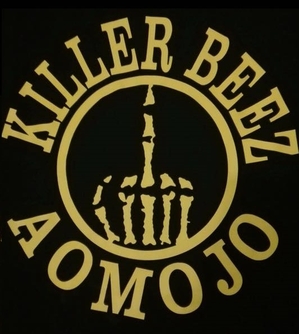
The Killer Beez are a large street gang based in New Zealand, mainly based in the South Auckland area. They were founded in 2003, as a large rogue street gang in Ōtara, as a spin-off of the larger "Tribesmen" gang. The Killer Beez were formerly headed by Josh Masters, a well-known kickboxer, also a former vice-president of the Tribesmen MC.

The Head Hunters Motorcycle Club are an outlaw motorcycle club in New Zealand. They are found all around the North Island, but are mainly based in East Auckland, with its headquarters being located in Ellerslie. They also have chapters in West Auckland, Wellsford, Northland and Wellington. They have a long criminal history, with more than 1000 notable criminal convictions.
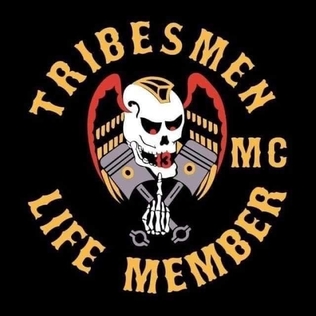
The Tribesmen are a prominent outlaw motorcycle club based in the North Island of New Zealand. They have a relatively large presence, having set up chapters in Ōtara, Northland, Rotorua, Murupara and Christchurch.
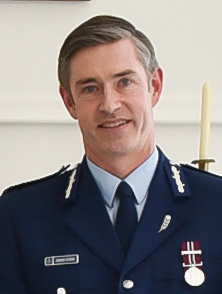
Andrew David Coster is the current Commissioner of the New Zealand Police. Having previously served as Acting Deputy Commissioner, he has served as the New Zealand Commissioner of Police since 3 April 2020.
There have been several COVID-19 protests in New Zealand held since 2020, where people protested the government's response to the COVID-19 pandemic in New Zealand, in particular the lockdown measures in place in March–May 2020, August 2020, and August–November 2021 and the later vaccine mandates. The protests have been largely condemned by members of parliament, as well as local city and regional councils. Fears were also raised about the protests increasing the spread of the virus.
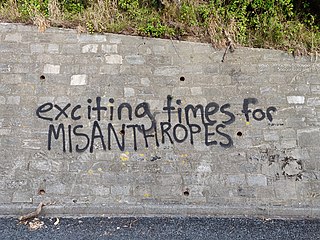
The COVID-19 pandemic in New Zealand has had far-reaching consequences on the country that went beyond the spread of the disease itself and efforts to eliminate it, including education, faith communities, Māori, mass gatherings, sports, recreation, and travel. In addition, there were several recorded cases of lockdown violations, leaks, and misinformation about the COVID-19 virus and vaccines.

Abraham Gabriel Gray is an American-born New Zealand cannabis activist, politician and founder of the Whakamana Cannabis Museum, New Zealand's first and only cannabis museum. Gray was a University of Otago lecturer and tutor for over a decade before founding the museum.

The Freedoms & Rights Coalition (TFRC) is a self-described "people's movement" founded by Destiny Church founder and leader Bishop Brian Tamaki in 2021 to oppose the New Zealand Government's COVID-19 lockdown restrictions and vaccine mandates. The group organised protests in Auckland and across New Zealand. In mid-July 2022, the Coalition launched a second wave of protests against the Labour Government, whom they accused of incompetence and contributing to the country's socio-economic problems and shortages.